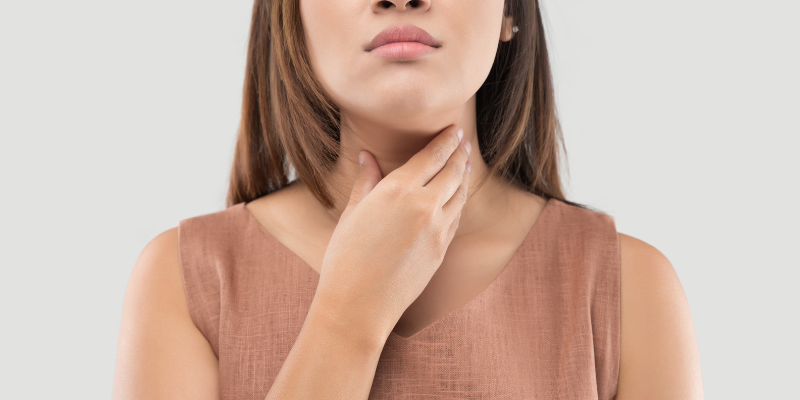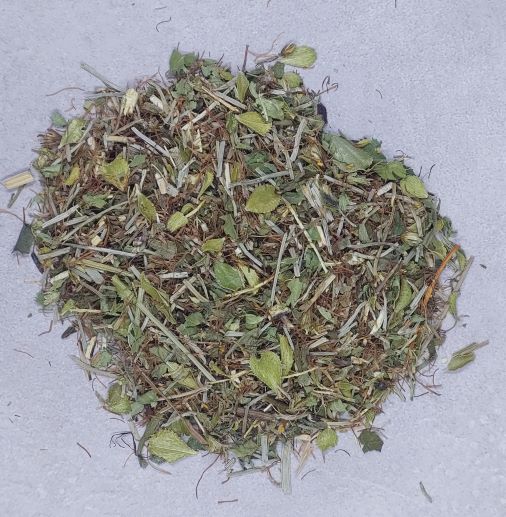As a naturopath, I believe in the power of the body to heal itself when given the right tools. One of the key tools in the fight against many health issues is understanding your thyroid.
The thyroid is a gland located at the base of your neck and it plays a critical role in regulating metabolism, energy levels, and more. But, for many people, the thyroid can become imbalanced, leading to a range of symptoms that can be difficult to manage.
With this article, my objective is to provide you with an overview of how to take control of your thyroid health and improve your quality of life and optimal well-being.
Let’s dive in!
What is the Thyroid?
The thyroid is a gland that produces thyroid hormones, and the most important hormone is thyroxine. Thyroxine is responsible for regulating the body’s metabolism and works closely with other endocrine glands, including the pituitary gland, to keep your body functioning smoothly.
You can think of your thyroid like your body’s accelerator pedal – it helps to control how fast the body burns energy.
The 3 States of the Thyroid
There are three main states that the thyroid can be in: hyperthyroid, normal, and hypothyroid.
We want to aim for the normal range. This is a healthy state where the thyroid is functioning in balance with the rest of your endocrine system.
However, in some cases, the thyroid can become imbalanced, leading to conditions such as auto-immune diseases.
Hypothyroidism – underactive thyroid
The most common thyroid imbalance I see my clients present with, and is generally the most common thyroid condition, is hypothyroidism. This is where the thyroid is underactive.
In the case of hypothyroidism the body is not producing enough thyroid hormone, and everything begins to slow down.
Symptoms of hypothyroidism include:
- Fatigue
- Hair loss
- Dry skin
- Depression and anxiety
- Weight gain
- Feeling cold
- Constipation
- Muscle aches
- Reduced fertility
Some people may also develop goiters, which are enlarged thyroid glands at the base of the neck that can cause coughing, swelling, or tightness in the throat.
You may feel like you have no energy, your weight won’t budge, and you don’t look like yourself.
A noticeable sign of hypothyroidism is dry skin. When the thyroid is underactive, the sweat glands stop working, and the skin becomes dry, red, and flaky. This can lead to a condition called myxoedema, which is a red, swollen rash. Your skin may be dry, especially around the shins, which is a common experience for many people.
It’s important to note that while many people with hypothyroidism experience dry skin, not everyone with dry skin has hypothyroidism.
If you’re concerned about your thyroid, there are some simple steps you can take to help keep your skin healthy, including using the right skincare products and avoiding products that contain drying agents. We will look at this more closely further along.
Hyperthyroid – overactive thyroid
Hyperthyroidism, also known as an overactive thyroid, is a condition in which the thyroid gland produces too much of the hormone thyroxine. The thyroid gland is responsible for regulating the metabolism, so having an overactive thyroid can cause an increase in the metabolism, leading to a range of symptoms.
Symptoms of hyperthyroidism include:
- Rapid heartbeat (tachycardia)
- Unexpected weight loss
- Increased appetite
- Nervousness, anxiety, and irritability
- Increased sweating
- Heat intolerance
- Fatigue or weakness
- Hand tremors
- Changes in menstrual patterns in women
Thyroid and skincare
When it comes to keeping your thyroid healthy, be mindful to avoid skincare and beauty products that contain the following ingredients:
- Parabens
- Synthetic fragrance
- Oxybenzone
- Triclosan
- Heavy metals
These ingredients increase the toxic load and some strip the skin of much needed moisture. If you have an underactive thyroid, you’re likely dealing with dry, flaky, and rough skin.
Prioritise natural, moisture promoting skincare and avoid using commercial soaps and washes, as these often contain sulphates and other drying agents that can strip the skin of its natural oils.
Instead, opt for body washes and soaps that are free of these ingredients, and use a deep-penetrating and absorbing cream or lotion after washing to help keep the skin hydrated.
Some of the best moisturising ingredients to look for include coconut oil, shea butter, and olive oil. Stay away from products like sorbolene, as these can actually dry out the skin even more.
Our range of Castile soaps, hand and body lotions are 100% natural and based on Olive Oil, which is incredibly moisturising and nourishing. Olive & Ash products promote moisture for comfortable, calming hydration – with no signs of disruptive toxins.
Testing for thyroid issues
If you’re experiencing symptoms of hypothyroidism, it’s important to have your thyroid tested. The most common test used to diagnose thyroid problems is the TSH test, which measures the amount of thyroid-stimulating hormone in the blood.
A normal TSH level is considered to be between 0.3 and 4, but different labs may have different ranges.
You may have gone to the doctor for your yearly health check and your TSH came back as, let’s say 4.5. Your doctor told you it’s a little high but they’ll keep an eye on it.
I am not here to disagree with the medical model but the difference, however the difference between naturopathic and allopathic doctors is that modern medicine treats disease, not prevents it. This model for treating thyroid disease is getting better but is still outdated and doesn’t take a holistic approach.
Naturopaths consider TSH levels above 2.5 as sub-clinical and aim to lower and maintain it. I personally had TSH levels at 4 for a few years with no symptoms, but thyroid disease can take 10 years to develop, so the wait-and-see approach isn’t ideal.
A lab range for thyroid is usually TSH .3-4. If your TSH is higher, your doctor may request a T4 test, which measures the levels in your cells. A T4 test alone isn’t enough to understand what’s happening with your thyroid. More tests can be expensive, but it’s important to get a clear picture of your thyroid’s health.
In early 2022, I was concerned about some unusual test results. Potentially the COVID vaccine I had received prior to the tests may have influenced the results, so I visited my doctor and asked for a comprehensive series of tests.
I was willing to pay for the tests out of pocket. I am now preparing for my next round of tests and am hopeful that the results will have returned to normal.
If you suspect you have hypothyroidism but your TSH doesn’t indicate it, TSH is just a starting point.
Free T4 is an inactive form of thyroxine that’s taken up by different organs and converted to T3. Reverse T3 is an inactive form of T3 that can affect T4 conversion to active T3. A high r-T3 means T3 may not be binding to your cells and can increase with high stress levels, restrictive diets, starvation, and chronic disease.
If your doctor is concerned, they may also test your thyroid antibodies to see if you have Hashimoto’s disease, which is a thyroid autoimmune disease.
When you’ve had full thyroid tests, your health practitioner should look at the ratios to see how your thyroid is performing. TSH levels can increase temporarily if you’re taking iodine, so the ratios become more important. T4-T3 should be 4:1 and r-T3-T3 should be >10.
Foods to support a healthy thyroid
Here’s a fun thyroid fact: The Japanese have the lowest rate of thyroid issues in the world!
This is a testament to the importance of a balanced, nutrient-rich diet in maintaining thyroid health. Iodine and Selenium are two essential micronutrients for the production of healthy thyroxine in the thyroid.
Unfortunately, Australian soils are lacking in these nutrients, and modern farming practices do not always help. This is why many common foods are now fortified to help people achieve healthy levels of these nutrients.
In the past, the dairy industry would wash their milk vats with iodine, which would then end up in the milk. However, this practice has since changed, and milk vats are now washed with chlorine, reducing the iodine content of milk. To ensure that you are getting enough iodine, consider growing your own veggies and feeding them with seaweed solution, which will increase their iodine content.
Iodine-rich foods
Japanese and Korean diets, which are high in iodine-rich seaweeds and seafood, are one of the reasons why the Japanese have such low rates of hypothyroidism. Ways to increase your iodine intake include adding seaweeds like sushi, baked nori sheets, wakame salad, kelp (from clean waterways), and spirulina to your diet.
Wild-caught fish is also high in iodine, while farmed fish may be low due to the food they are given. Coconut oil is another healthy option; it has been shown to support metabolism and is beneficial for thyroid health.
Fermented foods for good gut health
Good gut health is essential for optimal nutrient absorption, and fermented foods like kefir, kombucha, sauerkraut, and kimchi can support this. A high-fibre diet is also important, as it feeds gut bacteria and supports overall health.
Plant and bone broths
Broths made from meat bones and the sprouting of seeds and grains like chia, flaxseed, and hemp, as well as Alfalfa, broccoli, wheatgrass, and mung, are great sources of nutrients for thyroid health. The best source of selenium is Brazil nuts, so consider eating 1-3 Brazil nuts per day.
Filtered water
Drinking filtered water is important for overall health, as tap water contains fluoride and chlorine, which can inhibit iodine absorption.
Fruit and vegetables
A diet high in fruits and veggies should make up most of our daily calorie intake. However, certain foods, like those in the brassica family, such as cauliflower, kale, cabbage, broccoli, brussel sprouts, and soy, should be limited in large quantities if you have hypothyroidism.
Gluten sensitivity and celiac disease are common in people with thyroid issues, so it is important to check for hidden gluten in packaged foods.
There are many steps you can take to support your thyroid through diet. However, if you are unable to get enough iodine and other essential nutrients from food sources, supplements may be necessary.
I always recommend that you speak to your health practitioner of choice to get clarification for your presentation. You can also see a Naturopath, visit a reputable health food shop or chemist with a naturopath on duty to help you select the most suitable product.
I never recommend self prescribing or purchasing from discount outlets as these items can be of inferior quality.
Your health practitioner of choice should be your first point of call if you have questions.
Introducing Hypo(T) Thyroid Support
Hypo(T) Thyroid Support herbal tea is a wonderful way to support a healthy thyroid. The combination of Gotu Kola, Liquorice, Red Clover, Schisandra, and Withania in a herbal tea can help support a healthy thyroid in several ways.
Withania, an adaptogenic herb, helps to balance thyroid hormones and reduce stress. Liquorice also supports the adrenal glands, which are involved in thyroid function. Gotu Kola and Red Clover are rich in antioxidants that protect the thyroid gland from damage caused by free radicals. Schisandra helps to regulate the immune system, which can be helpful in autoimmune thyroid disorders. Together, these herbs in a herbal tea can help to support thyroid health and function.
How to prepare Hypo(T)
This tea contains a mix of both roots and leaves. After the flavours of the leaves have gone the deep-acting roots are still doing their job! This means you can reuse the same leaves 4-5 times (or until there is no flavour or colour left) to ensure all of the goodness has been extracted.
Remember; our herbal blends are made with only premium quality ingredients. This is important because it allows the leaves to be reused multiple times while still maintaining maximum benefits!


Add Comment